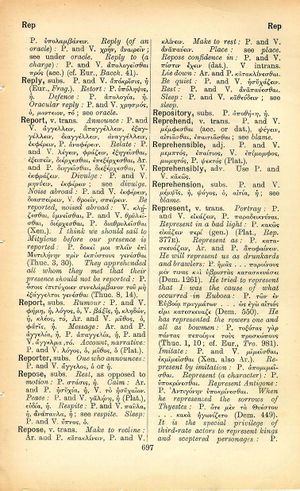represent: Difference between revisions
Φύσιν πονηρὰν μεταβαλεῖν οὐ ῥᾴδιον → Haud facile commutatur ingenium malum → Verdorbene Natur zu ändern ist nicht leicht
(CSV4) |
m (Woodhouse1 replacement) |
||
| Line 1: | Line 1: | ||
{{Woodhouse1 | {{Woodhouse1 | ||
|Text=[[File:woodhouse_697.jpg|thumb|link={{filepath:woodhouse_697.jpg}}]] | |Text=[[File:woodhouse_697.jpg|thumb|link={{filepath:woodhouse_697.jpg}}]] | ||
===verb transitive=== | |||
[[portray]]: [[prose|P.]] and [[verse|V.]] [[εἰκάζειν]], [[prose|P.]] [[παραδεικνύναι]]. | |||
[[represent in a bad light]]: [[prose|P.]] [[κακῶς εἰκάζειν περί]] (gen.) ([[Plato]], ''[[Republic]]'' 377E). | |||
[[represent as]]: [[prose|P.]] [[κατασκευάζειν]], [[Aristophanes|Ar.]] and [[prose|P.]] [[ἀποφαίνειν]]. | |||
[[he will represent us as drunkards and brawlers]]: [[prose|P.]] [[ἡμᾶς… παροίνους μέν τινας καὶ ὑβριστὰς κατασκευάσει]] ([[Demosthenes|Dem.]] 1261). | |||
[[he tried to represent that I was the cause of what occurred in Euboea]]: [[prose|P.]] [[τῶν ἐν Εὐβοίᾳ πραγμάτων… ὡς ἐγὼ αἴτιός εἰμι κατεσκεύαζε]] ([[Demosthenes|Dem.]] 550). | |||
[[he has represented the rowers one and all as bowmen]]: [[prose|P.]] [[τοξότας γὰρ πάντας πεποίηκε τοὺς προσκώπους]] ([[Thucydides|Thuc.]] 1, 10; cf. [[Euripides|Eur.]], ''[[Troades]]'' 981). | |||
[[imitate]]: [[prose|P.]] and [[verse|V.]] [[μιμεῖσθαι]], [[ἐκμιμεῖσθαι]] ([[Xenophon|Xen.]] also [[Aristophanes|Ar.]]). | |||
[[represent by imitation]]: [[prose|P.]] [[ἀπομιμεῖσθαι]]. | |||
[[represent]] (a [[character]]): [[prose|P.]] [[ὑποκρίνεσθαι]]. | |||
[[represent Antigone]]: [[prose|P.]] [[Ἀντιγόνην ὑποκρίνεσθαι]]. | |||
[[when he represented the sorrows of Thyestes]]: [[prose|P.]] ὅτε μὲν τὰ Θυέστου… κακὰ ἠγωνίζετο ([[Demosthenes|Dem.]] 449). | |||
[[it is the special privilege of third-rate actors to represent kings and sceptered personages]]: [[prose|P.]] ἐξαίρετόν ἐστιν ὥσπερ γέρας τοῖς τριταγωνισταῖς τὸ τοὺς τυράννους καὶ τοὺς τὰ σκῆπτρα ἔχοντας εἰσιέναι ([[Demosthenes|Dem.]] 418). | |||
[[suggest]]: [[Aristophanes|Ar.]] and [[prose|P.]] [[εἰσηγεῖσθαι]]; [[suggest]]. | |||
[[point out]], [[show]]: [[prose|P.]] and [[verse|V.]] [[δεικνύναι]], [[δηλοῦν]]; see [[show]]. | |||
[[represent a person]], [[look after his interests]]: [[prose|P.]] and [[verse|V.]] [[προξενεῖν]] (gen.). | |||
[[champion]]: [[prose|P.]] and [[verse|V.]] [[προστατεῖν]] (gen.). | |||
[[I as representing the greatest city ask you to come to terms]]: [[prose|P.]] [[ἐγὼ… πόλιν μεγίστην παρεχόμενος… ἀξιῶ… συγχωρεῖν]] ([[Thucydides|Thuc.]] 4, 64). | |||
[[I came forward though with no mandate to represent our house]]: [[verse|V.]] [[ἐξῆλθον οὐ ταχθεῖσα πρεσβεύειν γένους]] ([[Euripides|Eur.]], [[herac]]. 479). | |||
}} | }} | ||
Revision as of 08:49, 20 May 2020
English > Greek (Woodhouse)
verb transitive
portray: P. and V. εἰκάζειν, P. παραδεικνύναι.
represent in a bad light: P. κακῶς εἰκάζειν περί (gen.) (Plato, Republic 377E).
represent as: P. κατασκευάζειν, Ar. and P. ἀποφαίνειν.
he will represent us as drunkards and brawlers: P. ἡμᾶς… παροίνους μέν τινας καὶ ὑβριστὰς κατασκευάσει (Dem. 1261).
he tried to represent that I was the cause of what occurred in Euboea: P. τῶν ἐν Εὐβοίᾳ πραγμάτων… ὡς ἐγὼ αἴτιός εἰμι κατεσκεύαζε (Dem. 550).
he has represented the rowers one and all as bowmen: P. τοξότας γὰρ πάντας πεποίηκε τοὺς προσκώπους (Thuc. 1, 10; cf. Eur., Troades 981).
imitate: P. and V. μιμεῖσθαι, ἐκμιμεῖσθαι (Xen. also Ar.).
represent by imitation: P. ἀπομιμεῖσθαι.
represent (a character): P. ὑποκρίνεσθαι.
represent Antigone: P. Ἀντιγόνην ὑποκρίνεσθαι.
when he represented the sorrows of Thyestes: P. ὅτε μὲν τὰ Θυέστου… κακὰ ἠγωνίζετο (Dem. 449).
it is the special privilege of third-rate actors to represent kings and sceptered personages: P. ἐξαίρετόν ἐστιν ὥσπερ γέρας τοῖς τριταγωνισταῖς τὸ τοὺς τυράννους καὶ τοὺς τὰ σκῆπτρα ἔχοντας εἰσιέναι (Dem. 418).
suggest: Ar. and P. εἰσηγεῖσθαι; suggest.
point out, show: P. and V. δεικνύναι, δηλοῦν; see show.
represent a person, look after his interests: P. and V. προξενεῖν (gen.).
champion: P. and V. προστατεῖν (gen.).
I as representing the greatest city ask you to come to terms: P. ἐγὼ… πόλιν μεγίστην παρεχόμενος… ἀξιῶ… συγχωρεῖν (Thuc. 4, 64).
I came forward though with no mandate to represent our house: V. ἐξῆλθον οὐ ταχθεῖσα πρεσβεύειν γένους (Eur., herac. 479).

